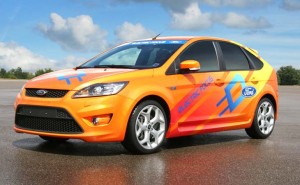
This specially-developed Ford Focus was developed for Jay Leno's new Green Challenge celebrity race.
Facing pressure from consumers and regulators alike, Ford Motor Co. is putting a heavy emphasis on downsizing, alternative powertrains and advanced gasoline technology, but the company won’t abandon its traditional emphasis on performance products, such as the Mustang.
Could clean, high-mileage alternative propulsion system deliver both better fuel economy and high-performance?
“Sure,” says Jim Farley, the automaker’s marketing czar and a serious muscle car fan in his rare off-hours. The good thing about electric propulsion, he points out, is that, “You get 100% of an electric motor’s torque the moment it starts turning, and that’s pretty exciting for customers who want performance.”
As an example, Farley points to the specially-developed battery-powered Ford Focus developed for superstar Jay Leno and used regularly in a celebrity racing segment on Leno’s new nightly TV show. The bright orange 5-door started out as a conventional version of the European Focus ST hatchback. Shipped to Michigan, it was given a 141 horsepower, 235 lb-ft electric drive system powered by 98 lithium-ion batteries.
The battery-electric vehicle, or BEV, has been used on the show since September 18th, when actress Drew Barrymore took part in Leno’s Green Car Challenge. And though it’s a one-off, Ford’s Farley says “It’s a very important program for us.”
A more conventional battery Focus – if one can use that term for the emerging field of electrication – will make it to market in a couple years, along with a battery version of Ford’s new Transit Connect van.
Could it be possible that the automaker might not only offer a battery car for mundane purposes, like commuting, but also offer a more performance-oriented variation? “I can’t confirm any plans at this time,” Farley begins, but then he offers a hint. “”We will always bring Ford’s penchant for performance to all of our products. We’re not going to delegate that just to Mustang.”
Initially, the focus on fuel economy will dominate the industry’s push to electric power. Today’s best batteries, like the lithium-ion pack used in Leno’s Focus, generate only about 1% of the energy, per pound of mass, that can be generated by burning gasoline. But most experts believe that next-gen batteries, whether using lithium or even more advanced chemistry, will become lighter, more powerful and less expensive.
Nissan believes that within a few years it will be able to downsize the battery pack for its first new battery car, the 2011 Leaf. If so, officials tell TheDetroitBureau, they could alternatively offer buyers a larger, longer-range pack for more money. There’s also the possibility that a more energy-dense battery could be offered as an option to those who want higher performance.
Muscle, many believe, won’t go away. It will just be redefined.
